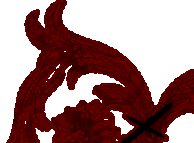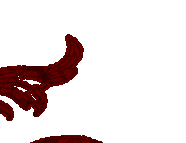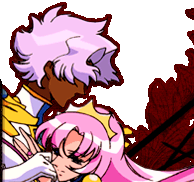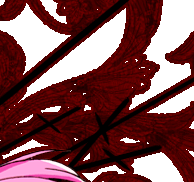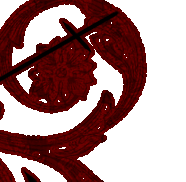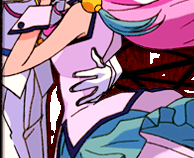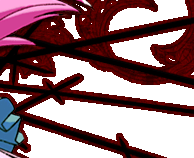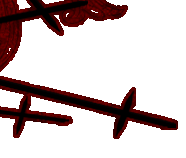

Shoujo Kakumei Utena, known in North America as Revolutionary Girl Utena, is steeped in surreality. Apples are whole one moment, and then inexplicably sectioned into pieces and perfectly laid out in a circle in the next. Planets and galaxies are seen to hang directly outside of dorm windows. Cars race along the boundaries of an arena perched atop an endless staircase, and in the sky above, a fairytale castle is suspended upside down, rotating there with nothing to anchor it. Sword duels are fought in this arena, and surprisingly, a depth of human emotion and motivation is exposed through these duels– a condensed version, perhaps, of the emotions and motivations people experience every day. In effect, the duels and events of this series investigate the workings of the human mind, much as Freud investigated them. The Freudian influence on this series is not merely confined to the blatant visual symbolism, but also invests the many characters in this complicated series. Three of them in particular stand out. The three characters, Utena Tenjou, Akio Ohtori, and Anthy Himemiya, represent various aspects of Freudian tradition and depict growth of the human mind, as illustrated by the last two episodes of Shoujo Kakumei Utena.
The hero of Shoujo Kakumei Utena is, of course, Utena Tenjou herself, a girl whose childhood experiences instilled in her the desire to become a Prince. Throughout the series, this memory is referenced often; however, Utena herself remembers very little of it, keeping the idea of strength, nobility, and her goal of Princehood foremost in her mind without understanding that the bulk of the memory is buried in her unconscious. The motivation for her Princely actions through the greater part of the series is nothing more than a strong but vague desire to live up to the standard set in her memory. The memory is eventually revealed in all of its full horror, and in the last two episodes, Utena is functioning with complete knowledge of the repressed memory. She has attained insight, in the Freudian tradition, and has reconciled the events of her past with the person she wants to be. The person she wants to be, however, has been created by outside influences, specifically Akio’s machinations. Utena’s only goal is to be a Prince, and that has been carefully reinforced by the environments she has been exposed to, the people she has interacted with, and the center of her Prince fixation, Anthy. In this way, she is a representative of the superego; she is an accretion of the ideals and moral strictures of her environment, she strives for perfection over her own pleasure, and concerns herself most with the moral aspiration of becoming the archetype that Shoujo Kakumei Utena terms as a ‘Prince’. Utena is the distillation of the superego, an aspirant to the ideal of a Prince, and all her life has led up to that goal.
The villain of Shoujo Kakumei Utena is Akio Ohtori, a smooth-talking, long-legged older man with a penchant for manipulation and a complete lack of morals. At the current point in the series, he serves as the Acting Chairman of the academy Utena attends. This character’s origins and nature are unclear, except that he is either the more matured version, or the equal opposite of the original Prince archetype, Dios. Throughout the series, Akio displays a stunning lack of regard for social mores, morals, and human kindness, preferring instead to use others for his own gain. His list of sexual conquests includes, but is not limited to, his fiancee’s mother, his own sister, and Utena herself. His cruelties include manipulating one of his students into performing a ritualistic sacrifice of a hundred of his other students, and crushing the spirits of those involved with the dueling game he runs. He has convinced them that the things they desire lie in the castle, and though they do not realize their striving only serves his ends, they fight desperately for their chance to inherit eternity, miracles, or simply power. Akio is representative of the id; he denies himself nothing, and no amount of attachment, emotional or otherwise, can stand in the way of his desires. He follows the pleasure principle, gratifying his needs as he sees fit. One could also make a strong argument for his use of the primary process, forming images of the objects of his own and others’ desires through use of his illusions. Despite his lack of morals, he does indulge in rationalization, denying the existence of the Prince figure and implying that to be an adult, one must recognize the value of his machinations. Akio’s villainy sets him up as the perfect foil to Utena’s heroism; in essence, the id and superego in conflict.
Akio and Utena do not only represent the id and superego. They are also representative of Eros and Thanatos, the life and death drives. The drive toward life, Eros, is metaphorically represented by Akio. The swords of humanity’s hatred are meant to destroy the Prince; Akio, the only one with even a small claim to being a Prince, is their focus. He escapes this fate by allowing Anthy to shield him from the swords, and not only that, but makes a pretense of trying to rescue her from her suffering, but never actually moves toward it. He preserves his own skin first and foremost. He is also very much involved in pleasure-seeking, and gratification of his libido. Utena, on the other hand, represents Thanatos, the drive toward death. Within the strictures of the show, the Prince archetype is one that is destined for death; the Prince spends his life rescuing others, and wears himself down doing it, but his own life is less important to him than that of others. Utena comes to represent this drive because of her aspiration to be a Prince; her efforts will lead her to destruction, but she does not attach any importance to her own survival. Curiously enough, the duels Utena fights are challenges on the way to her achievement of the Prince archetype, and in the Freudian tradition represent the aggressive urges that spring from the thwarted death drive. Utena wishes to be a Prince– to achieve death– but before she does, she must first face challenges of aggression. It is possible that, in a psychological sense, Akio forced her into those challenges to test her willingness to be the human embodiment of the drive to die. Akio and Utena provide a perfect set of conflicts; Eros and Thanatos, and id and superego.
The center of this tangle, and the most important character to both Akio and Utena, is Anthy Himemiya, Akio’s sister, and Utena’s best friend. Her role requires some explanation; she is the Rose Bride, the prize of the dueling game, and the subject of Utena’s repressed memory. Thus, she is the catalyst for Utena’s desire to be a Prince; her suffering at the hands of humanity moves Utena to swear that she will grow up strong and noble, so that she can someday rescue Anthy. On Anthy’s part, her motivations are very rarely distinctly her own; outside of Utena’s influence, she serves as the mechanism by which Akio obtains his gratification, whether sexual or in manipulating others. Both Anthy and her brother consider her to be ‘a doll without a heart,’ meant to facilitate his interaction with the world and his ability to gain the things he desires. Her ego does not exist for herself, but for his use. Utena puts Anthy’s ego to different uses. Utena’s influence allows Anthy to strive for something better; morality, and existence as something other than the adjunct of the id. Utena’s presence also allows her to act in a way very similar to the secondary process, delaying and averting the id’s gratification. In the last two episodes, especially, Anthy is portrayed as having very little will, or ego strength, of her own. She is treated as an incomplete person, while the other two characters are treated as representatives of the structures of the mind. Furthermore, her history implies that for a lengthy period of time, her only function has been to serve the desires of the id, which, if taken as a pattern for the functioning of a real human’s personality, would place her at a point before the development of the superego. Anthy serves as a representative of the ego; she is also a depiction of a human being.
The climax of Shoujo Kakumei Utena is where the most meaningful interaction between the characters takes place. Akio and Utena engage in combat, much as the id and superego would do if the ego were absent, or as Thanatos and Eros do. It is interesting to note that most of the attacks Akio makes on Utena are moral attacks, questioning her moral superiority and her fitness to question him. In effect, this questions her right to be what he has crafted her to be; she, however, overcomes his attacks, not because she does not believe him, but because she is more concerned for Anthy than she is for herself, thus proving her to be both the keeper of morals, and the inheritor of the death drive from the fallen Dios. In the midst of this battle, she comes near to achieving death when Anthy, in her role as facilitator for Akio’s desires, stabs her through the stomach, allowing Akio to take the sword formed from her soul and use it to gain the power he desires. To put it in Freudian terms, the ego and id have sided together, and the superego cannot force its more moral desires on the two of them. Akio’s bid for power fails, of course; by the internal logic of Shoujo Kakumei Utena, the power of a Prince cannot be wielded by one who is not a Prince, and Akio is only someone who used to be a Prince. Utena, however, continues on in her self-imposed quest for Princehood, crawling to the Rose Gate where the power rests, and finding there, instead of a gate, a coffin containing Anthy, who reaches out to her for the first time. Utena’s struggle to rescue Anthy has finally touched Anthy in a way that is more than superficial, and though Utena fails to save her, Anthy stops functioning as an ego caught between the superego and id, and starts to function as a person. Her eventual desertion of Akio, and her insistence that Utena is not dead is a part of this functioning. Anthy has reconciled her own id, strengthened by years of Akio’s id-driven bidding, and her superego, newly-fostered by Utena, with the help of her own ego, no longer siphoned off to do the bidding of others but functioning for her alone. The other two characters have achieved their just ends; Utena has died, or at least disappeared, fulfilling the drive to Thanatos, and Akio is left alive to survive on his own and do as his libido drives him, though without his sister’s help. In the end, they all fulfill their roles; Akio and Utena as representations of mental structures, and Anthy as the integrated, fully functioning person who has learned the worth of both.
These characters and their situation fall neatly into Freudian psychology as representations of drives and structures comprising a whole person. Each of these three characters has a developmental purpose, and a role to play in the growth of Anthy Himemiya. Freud’s theories, as well as his symbolism, are strongly represented in Shoujo Kakumei Utena, through the symbolic visuals, and through the intense investigation into the way minds, emotions, and personalities work. There may be completely surreal moments in the series, such as trains running across balconies, or disappearing walls of pinwheels, but there is also deep exploration of the human psyche. This deep investigation is the core of both Shoujo Kakumei Utena and Freudian psychology; the series entertains, Freud’s works inform, and both connect strongly with real life.
 |

